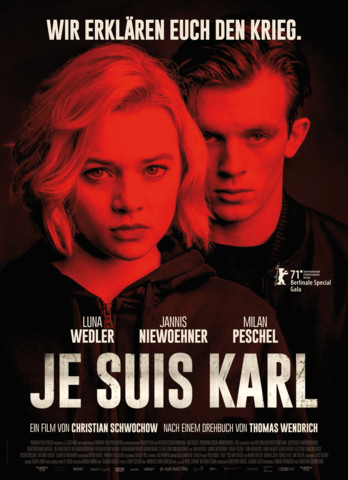Je Suis Karl

It’s rare that a film seems entirely reverse-engineered from a college politics seminar, but it’s been a strange year, altogether. This purportedly contemporary, state-of-the-continent thriller pitches a terrorist blast in the middle of Berlin and traces the implications for its survivors, a solemn and bespectacled father (Milan Peschel) and his impressionable teenage daughter, Maxi (Luna Wedler), who has a suspiciously Aryan look about her. In the traumatic aftermath, the latter is approached by a charismatic young man, Karl (Jannis Niewöhner), the figurehead of a global reactionary movement, who has the sweeping political answers to help explicate her loss and renew her sense of hope.
From conception to execution, this work is anathema to cinematic taste and psychological insight, which could mean it were fun and provocative, but it’s rather artless, indulgent and self-serious. Karl’s not-at-all dubious motives for first approaching Maxi are laughably revealed within the first hour – the bomb was in the packing peanuts! – and the subsequent signposting of his world domination prospects are ploddingly inserted for the rest of the roughly two-hour runtime. The character’s delusions of martyrdom are drip-fed to the audience like a slow poison, and his efforts to stoke racial and religious tensions highlighted with a red marker pen. Thomas Wendrich’s demonstrative screenplay is the main culprit, and the heavy use of symbolism, namely a recurring dead bird, is wearying.
The script’s persistent deployment of pernicious semantics, which seek to unveil the truth behind Karl’s beliefs, accrues to the point of exhaustion. He’s not a black shirt, he just happens to wear one! Sieg Heils? No thank you, it’s a raised fist! What we need in Europe is a “solution”! And so on. All the while, Jens Klüber‘s hyperactive shot/reverse-shot style of editing distracts as it insists upon its existence. Director Christian Schwochow has his moments, applying a creepy home video aesthetic to the very liberal couple as they smuggle an asylum seeker over the border. Suitably ominous, too, is the gay pride flag hung from the same family’s balcony. It’s only going one way. Other elements of Karl’s network appear persuasively stylised: the happy-clappy youth rallies, the pretty-cool sans serif logo design, the dead-eyed clips of attractive people dog-whistling and making vague threats of “regeneration”.
These measures to seduce members to the cause adequately show new tactics of the radical right (in its various incarnations), which often leans into university fair vibes and millennial culture to articulate its shopworn screeds. The filmmaking is technically proficient, overall, but the character of Maxi, upon whom the viewer’s sympathies supposedly rest, is a cipher. She googles Islamism, looks moody, and immediately signs up for a radical death cult: an irony for dunderheads. She gets off lightly. The weakest portrayal is that of the Libyan refugee, Yusuf (Aziz Dyab), whose character arc is offensive at best and inexplicable at worst. This critic usually sides with the value of useless art, but in this instance, there are probably enough fascists going around without the need to make any more of them up.
Joseph Owen
Je Suis Karl does not have a UK release date yet.
Read more reviews from our Berlin Film Festival 2021 coverage here.
For further information about the event visit the Berlin Film Festival website here.
Watch the trailer for Je Suis Karl here:



























Facebook
Twitter
Instagram
YouTube
RSS